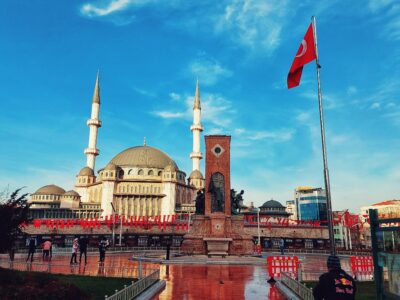
Image courtesy of Sydney Allen via Canva.
Between Russia’s ongoing war in Ukraine and the Kremlin’s blackout on independent media, crackdowns and state targetting against journalists in South Asia — specifically Pakistan, India, and Sri Lanka, the state spying on journalists in Venezuela, and the ongoing oppression of journalistic freedoms in Myanmar, many countries saw the erosion of media freedoms over the last year. Meanwhile, some counties, such as Turkey and Thailand, are approaching a precipice — a tipping point that will decide whether media freedoms, democracy, and human rights will prevail or whether they will further backslide toward authoritarian regimes.
Journalists and others working in the media sphere have faced unprecedented challenges in recent years as they were increasingly oppressed, arrested, silenced, threatened, and more. From online attacks and bullying to doxing and physical violence — these challenges can have a chilling effect on media and allow authoritarian governments to thrive. Marginalized media workers such as women, LGBTQ+ reporters, and those from minority groups are especially at risk for such attacks. In a recent report, UNESCO described the added challenges that women journalists face for simply doing their job. “Globally, women journalists and media workers face increasing offline and online attacks and are subject to disproportional and specific threats. The gender-based violence they are exposed to implies stigmatization, sexist hate speech, trolling, physical assault, rape and even murder.”
This is the context in which we celebrate World Press Freedom Day (WPFD) on May 3, 2023. WFPD’s theme this year is “Shaping a Future of Rights: Freedom of expression as a driver for all other human rights.” This theme represents an inspirational vision for the future where human rights are guaranteed through the work of journalists and free speech advocates. As part of our mission to highlight challenges to freedom of expression and promote human rights, Global Voices launched the Unfreedom Monitor in March 2022, where we analyze and document how digital communications technologies are being used to advance authoritarian governance around the world. Similarly, in our Civic Media Observatory work, we have highlighted the importance of an independent press by exploring how Russia has coopted domestic media to wage a propaganda campaign to build support for its war against Ukraine.
Through these hardships, there are signs of hope. There are still hundreds of thousands of journalists persevering in reporting the truth and working to make changes in their communities. And in some cases, they are succeeding, even in the face of government pressure. One instance is Fiji, where journalists successfully forced the government to roll back a draconian media law. In Côte d’Ivoire, environmental journalists have successfully made headway in reporting on environmental exploitation, prompting the government to implement new protective measures. And in 2022, citizens in Colombia elected a leftist president, signaling a pivot toward a more progressive, egalitarian society where press freedoms can be protected. These are just a few examples of the ways journalists are successfully pushing for a better future, even as authoritarian regimes try to undermine them.
Freedom of expression is one of Global Voices’ most treasured values, and in observing World Press Freedom Day, we emphasize stories that are often neglected in mainstream media coverage, highlighting the perspectives of regular citizens, marginalized communities, and the work of local journalists.
To read a selection of our work on press freedom from the last year, see the stories below:
Stories about World Press Freedom Day 2023
Russian Nobel laureate Dmitry Muratov: ‘Repression occurs when no one knows who might be targeted tonight’
"So who is opposing this potential junta, these armed people? Paradoxically, only the ability to speak the truth can stand up to armed men vying for power."
Press freedom also means media in indigenous languages: The case of France's Occitan
Media production and access is essential to the revitalization of indigenous languages, as the case of Occitan, spoken less and less in southern France, demonstrates.
The plight of Kurdish journalists in their struggle for free expression
Kurdish journalists lack a recognized nation state and political recognition. They face opposition from their host countries, which attempt to erase their identity and suppress their freedom of expression.
The quiet weeding out of Hong Kong’s media landscape
In 20 years, Hong Kong has dropped from 18th to 148th in the World Press Freedom Ranking, which translates into less critical coverage, less investigative reporting, and a less appealing work environment for talented journalists.
The press and human rights in Trinidad & Tobago
"I believe press freedom is intrinsically aligned to a wide swathe of freedoms and human rights ..."
The Caribbean outlook on World Press Freedom Day
Despite dismissiveness from elected officials, as well as instances of verbal abuse and cyberbullying, Caribbean journalists press on.
Shimaa Samy discusses the challenges of being a journalist in Egypt today: an interview
Egyptian laws limit freedom of expression, with charges of blasphemy, incitement, spreading false news, destabilizing the country. Even "protecting family values" is often used as a pretext to suppress journalists.
Pakistan's war on journalism: Abduction and arrest of prominent journalists
Journalists in Pakistan continue to face harassment, arrest, and abduction for their reporting on sensitive issues. In recent years, several prominent journalists and media workers have been targeted and killed.
Why tech companies can no longer ignore their role in shaping politics and society
As the influence of tech companies continues to grow, it falls to civil society, journalists, tech users, and watchdog organisations to keep these firms accountable.
Sri Lanka's proposed anti-terrorism law aims to curb civil protests
There is growing dissent within Sri Lanka against the proposed Anti-Terrorism Act (ATA), which is intended to replace the existing Prevention of Terrorism Act (PTA) and the accompanying bill.
‘A great day to be a journalist in Fiji’ as Parliament repeals ‘draconian’ media law
"Some of Fiji's best journalists left the industry as a result and the media still carry the mental scars today from that very disturbing period."
In Turkey, will one man continue to rule them all? The May 14th elections hold the answer
The stakes are high, and there is a growing sense among the general public that if the current leadership stays in power, the country's future is grim and uncertain.
Environmental investigative journalism makes headway in Côte d'Ivoire: An interview with Ismael Angoh
From environmental resource misuse to open dumping of toxic waste or wastewater in its rivers, Africa’s environmental issues are plentiful. Global Voices interviewed Ismael Angoh to understand this profession's challenges.
The Myanmar junta’s war against Facebook
Social media platforms have an oversized influence on political events such as elections, and they have a responsibility to advance democracy.
A murder victim, rape survivor, and porn star: Hong Kong's media biases highlight misogynist social undercurrents
Abby Choi’s femicide, Maple Yip’s whistleblowing, and the release of Erena So’s porn film have triggered debate about media ethics and gender awareness in the Hong Kong.
Pakistan's recent Wikipedia ban sparks controversy over blasphemy laws and freedom of speech
The Pakistani government has repeatedly enforced several restrictions on accessing certain websites and online material, often citing reasons such as national security, blasphemy laws, and moral principles.
Photos stolen, compensation denied: The plight of Rohingya Photographers
The works of Rohingya photographers were used by international non-profits and media houses without consent or paying for them. Global Voices interviewed journalist and filmmaker Shafiur Rahman to learn more.
How Russia has changed a year after the invasion of Ukraine
Local politics has been put on the back burner, civil society is in shambles and opposition media is trying to reach Russians while in exile
Journalist coverage spurs student dormitory in North Macedonia to build access ramp for people with disabilities
The lack of an access ramp made it impossible for students that use wheelchair to have three meals per day in the cafeteria where all the other students eat.
Online gender-based violence: A tool of digital authoritarianism in India
Women journalists in India have been trolled, received death and rape threats, found themselves objectified on apps, and are allegedly targeted by spyware like Pegasus.
In Azerbaijan, journalists unite in saying ‘we do not want licensed media’
The campaign demands that the government repeal the law, alleging it violates Azerbaijan's Constitution, and remove the requirement for registration with the Media Registry.
























